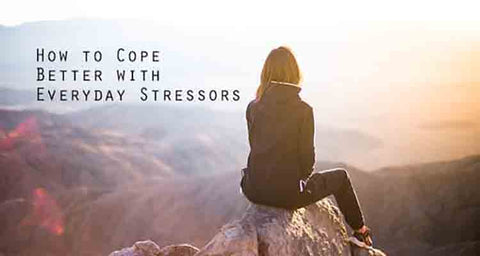
Stress. It’s not good for us. But, we’re also told that some stress is good for us, it ‘keeps us going’ and that a bit of pressure keeps the wheels of productivity well oiled. So some stress is good, too much is bad. But how do we know if we’re too stressed? Constantly wound up, angry, over emotional and always tired? I’d say you’re probably too stressed. Even if you don’t feel like this every day, unwanted stress can mount up.
So now’s the time to take stock and try to deal with those everyday stressors. But these little things are hard to avoid, right? Not having a clean work shirt, a delayed train, a queue at the coffee shop and then a pointless meeting can all build up and cause you to have a pretty stressy day.
When Good Turns Ugly
That good stress I mentioned. That pressure. It makes us feel good, wanted, even, doesn’t it? Like we’re important and we have a role to fill, a purpose. It motivates us and gears us up for the next challenge, be that work-related or in our personal life.
But even this good stuff can turn into bad stuff. What if we don’t fulfill that role or meet that target? What if the just-challenging-enough demands on us start to pile up?
We find ourselves stressed, in a bad way. We might then start sleeping badly, eating badly or picking up bad habits, like smoking, drinking too much or turning to any of our other vices. We get ill, physically and/or emotionally, we feel anxious, we get depressed. Productivity takes a nosedive and even a vacation doesn’t have the same restorative effect it usually does.
Stress Awareness Month
But guess what? April is Stress Awareness Month, which is encouraging us all to share ways of reducing stress. So here are our top five ways that we cope better with everyday stress:
- Being active – Yep you knew it didn’t you? Number one – bam, straight into the exercise. But we can’t stress (sorry) it enough – the benefits of exercise, especially out in the fresh air are a thousand-fold. Post workout endorphins make us feel amazing, don’t they? We might not feel like starting, but boy if we could bottle that feeling afterward, we would.
- Being grateful – It’s an odd one to add to this list, but gratitude for what we have is a powerful de-stressor. Being thankful for our health and well-being, our family, our home, our dog, it’s all powerful stuff. Try it. Write a list of all the things you’re genuinely grateful for. Bet you it’s longer than you first think.
- Being mindful – Similar to being grateful, being mindful of all that’s around us really helps to de-stress. You can use a mindfulness app to talk you through a guided meditation or you can just take a walk at lunchtime and breathe. Take in all that surrounds you, every little sight, sound, and smell. You’ll be amazed at what you’ve been missing.
- Being accepting – You can’t change that late train or that queue in the coffee shop, no matter how hard to clench your fists and stamp your feet. The best thing you can do is accept it. Breathe and accept it. After all, what is getting angry about it going to do? To anyone? Nothing. It might even make that busy barista move purposefully slower. And it’s not their fault anyway, is it? Do yourself, and the coffee shop a favor and just let it go.
- Being generous - What feels better than making someone else’s day, huh? As little as a smile to that cute guy or girl you see every morning or as big as donating your bonus to a charity. Even buying a coffee for the homeless person on the corner (I mean if you’re in a queue, you might as well buy two anyway, right?) For that brief moment, you’ll have made a difference to someone’s life. And that sense of pride and warmth is a mood-boost in itself, isn’t it?!






